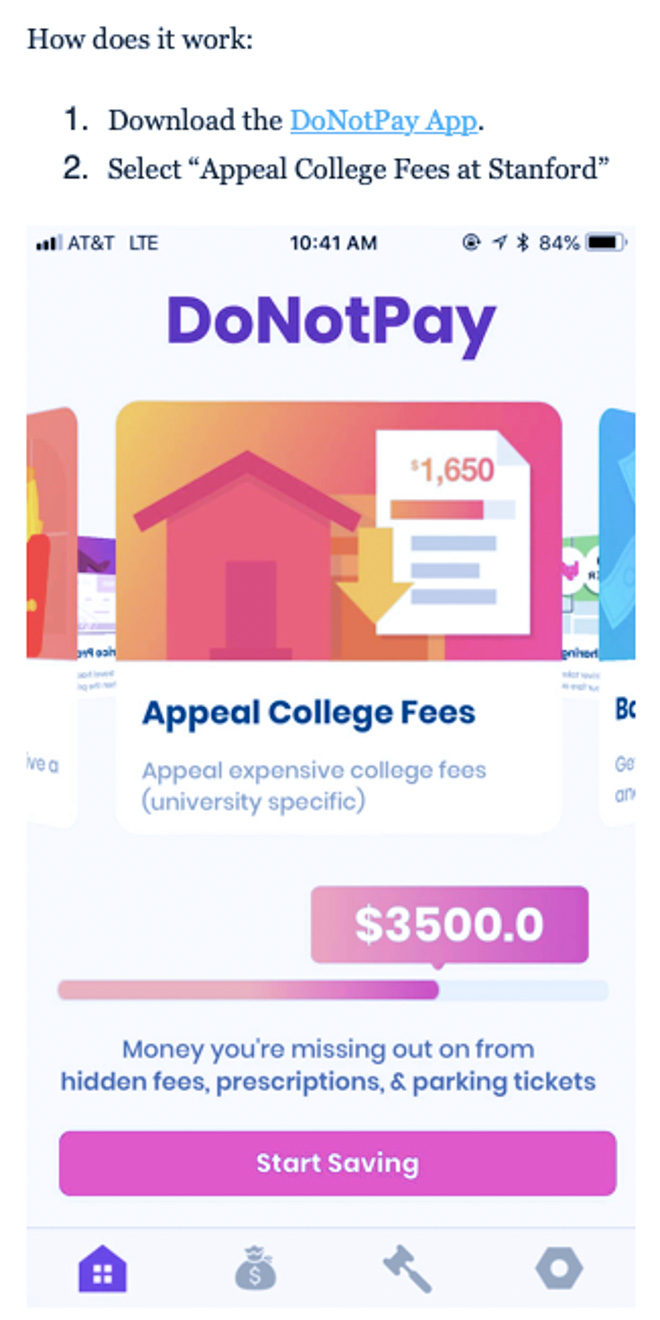Students were offered the opportunity to “appeal college fees at Stanford” in an email circulated on Thursday by an unknown author under the pseudonym of John Adams. The email advertised the services of DoNotPay, an AI-powered chatbot company started by Joshua Browder ’18 to offer legal counsel.
According to the app’s Apple app store description, DoNotPay is “the world’s first robot lawyer,” helping users “fight corporations, beat bureaucracy and sue anyone at the press of a button.” Browder said Stanford students could use the app to get money back for “unnecessary fees,” including unused meal plans, overcharged fix-it requests and activities fees going toward campus organizations.
Browder said he started DoNotPay three years ago after receiving 30 parking tickets. Now other “people can use [the app] to get money back,” he added.
“We appeal loads of fees — helping consumers fight big corporations, government, bureaucracy,” Browder said. “Helping you get out of your parking ticket, fight Wells Fargo overdraft fees.”
The email, said to be from from “the office of John Adams,” told recipients that “Stanford charges you hundreds of dollars in unnecessary fees” every quarter. It also offered recipients the opportunity to “get this money back” using DoNotPay’s service.
The email further claims “You are receiving this email because you opted in via our website.” Multiple sources who received the email denied opting in. University spokesperson Ernest Miranda noted in an email to The Daily that “the University is looking into [the matter].”
Browder later clarified that the contacted student emails were publicly listed on Stanford Who. He noted that the mailing list was manually created by his associate, who has no connection to Stanford.
Thursday’s DoNotPay email was not the first widespread effort to facilitate a fee-waiving process for Stanford students. In Oct. 2017, an edition of the Fountain Hopper (FoHo) informed students that they have a right to waive their Student Activities Fee, including a link to an online waiver form and encouraging students to “waive responsibly.”
Controversy over the fee-waiving process arose as some students pointed out that using the DoNotPay app might take funds away from on-campus clubs. Shi Tuck ’20 sent an email to the far-reaching the-diaspora list server, asking students to “send a kindly worded reply” to DoNotReply informing the company that “the stolen money is what funds most clubs.”
“Since people keep waiving these fees, our clubs having been losing many thousands of dollars annually, and by blindly downloading this app and waiving your special fees you are essentially taking that money away from the clubs,” Tuck wrote in the email. “In mass, this is really harmful.”
In an email to The Daily, Tuck wrote that in her former role as the co-president of the Stanford Student Space Initiative, she experienced firsthand the impact of clubs losing a large amount of their funding due to students waiving their activities fees. According to Tuck, the club struggled with funding shortages and considered diminishing the number of students they could afford to onboard.
Tuck also criticized the way in which DoNotPay attempted to reach students, saying the company’s tactics were “predatory” and targeted at new students who might believe the “myth” that waiving their fees was a harmless way to cut a financial corner.
“It’s not a cool hack to fight the Stanford establishment and save money … it’s a fast way to defund every cool club we have here at Stanford,” Tuck’s email in the-diaspora continued, stating that the money saved by students using DoNotPay’s services would likely be as low as $25.
On the other hand, Browder told The Daily that the money saved would actually be $176 for just waiving the Student Activities Fee.
Browder brushed off these criticisms, saying that “a lot of people don’t like what [the app] is doing” and adding that critics are “trying to come up with whatever they can.”
“A lot of people are benefiting from these dues because there are a lot of student groups that aren’t that popular, but they’re getting funds, even though if it was a system where you had to vote they probably wouldn’t be funded,” Browder said. “I think a lot of [the student groups] aren’t providing much value — and there are a lot of Stanford organizations that don’t provide much value but are getting thousands of dollars and going on these expensive trips.”
In fact, the student body annually votes on funding each student organization.
“They’re very scared,” he continued. “And because they’re scared they come up with arguments against it.”
Browder claimed that after the email was sent out, over 1000 Stanford students downloaded and used the DoNotPay app. He did not provide data to back up this claim.
He said DoNotPay chose the pseudonym John Adams as “historical satire” because the legacy of John Adams “align[ed] with [company’s] mission.”
Contact Cooper deNicola at cdenicol ‘at’ stanford.edu.
This article has been updated to reflect that students vote on whether to fund groups.
